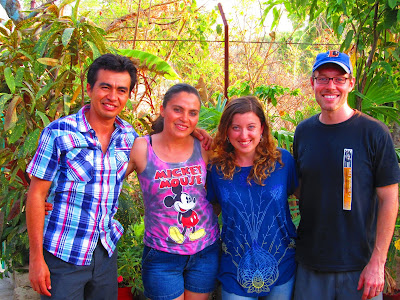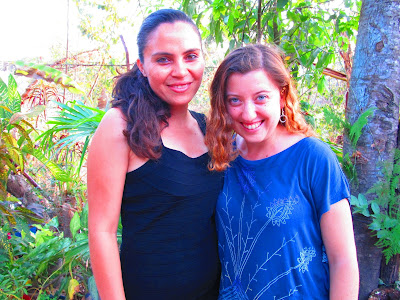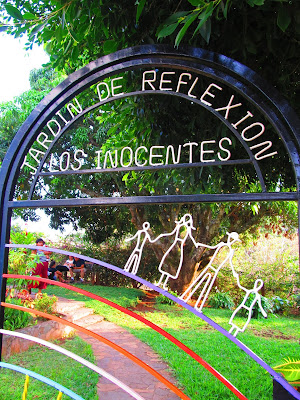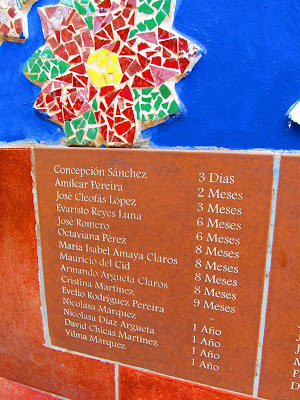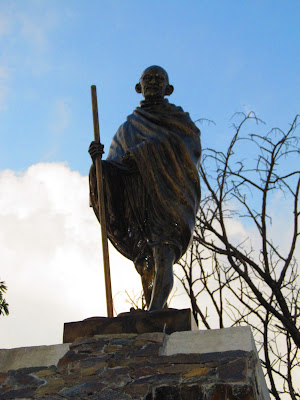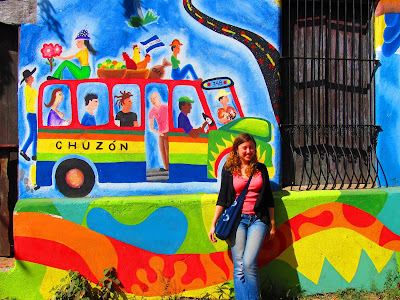I still remember when we first arrived at the apartment. The backyard was overgrown with bushes and trees. I had no idea what my roommate Elba was saying. And, there was a hole for a door between our two rooms, with a curtain separating the space. I was nervous and scared of losing my precious privacy.
Now the backyard is beautiful, and there is a big dresser and mattresses inbetween our two rooms - which is almost as good as a door!
Noel and Elba are a beautiful couple, the kind that gives you energy just by being around them. They have been together for more than 10 years. They are from a tiny rural community in Cabanas, an area of El Salvador that has been hard hit by the pollution of mining companies. When they were teenagers, they taught a group of 30 preschoolers in Elba's house. There was no building for the preschool, and no money to pay the teachers. By a struck of luck (or fate?) an American couple named Don and Paula from Maryland arrived. They were part of the organization International Partners.
After spending some time in Cabanas, the organization offered to work with the community to build a preschool. It was a great partnership, and Noel and Elba had a new place to teach. Noel used his artistic skills to paint the walls, and make ceramic tiles for the floors. Elba sang with the children. The new building gave them the opportunity to learn in a safe place with enough space.
After building a relationship with Noel and Elba, Don and Paula and the board of directors began talking to the couple about their dreams. "No one's ever asked us what our dreams are, we'll have to think about it," they said. After thinking they both decided, "we would like to go to University". International Partners offered them a scholarship.
Let's back up to when Noel was 11. Noel's father was nowhere to be seen, he had to support his family. He began working in the corn field, with no parent in the house. It was his job to cook, and clean, and work. His mom had to move to San Salvador to find work, and visited 2 times a month. He dropped out of school at 16 years old, and worked in a bean field for $2.00 a day. When his mother's diabetes got worse, she had to quit her cleaning job in the capital. It was his turn to support the family. He attempted crossing the border in the US to try to make a better life. He was caught and detained 3 months in Miami.
Noel's mother told me that she never imagined in a million years that he would go to university. He is incredibly bright. He was able to finish his bachlirato "GED" program, and graduated with honors. Noel said he would surely be working in the bean fields if it weren't for this opportunity to learn.
Elba had her share of hardship too. Her father abandoned them with little to eat and a simple house. She was able to finish high school, working after school in her mother's store and doing homework until midnight. She was thrilled to recieve a scholarship to go to university, but had to cross a difficult barrier. She gets very nervous taking tests. Hands shaking, queasy, stomach troubles, you name it. In order to enter the National University, you have to pass a test similar to the SAT and they base their admissions soley on this test. She took the exam once, then twice, and both times not able to make the grade. There are only 2 chances. Elba, along with other students with difficulties taking tests, arrived every day outside the University to protest. After 3 months of raising their voices, the University allowed the students in.
Elba told me she didn't know what professions existed. What can you study in university? Growing up in a rural town, the only options were teaching, owning a store or working on a farm. She had wanted to study physical education, but there was not room in that program. She began in Anthropology. After a year she learned about Social Work, and knew that was the best fit. She fought tooth and nail until they were able to find room for her in the social work program, and she knew she was in the right place.
Elba and Noel graduated from university this March. With their new skills, they are continuing to work with International Partners. Noel runs a farm in which they breed cows and teach improvrished people how to care for them. They give the person a cow, with the expectation that when the cow has a calf that it will be given to another family. Sometimes I think of all the lives he is reaching with this concept... it is pretty incredible. With one cow families are able to feed everyone in their house, or start their own milk and cheese business.
Elba is using her social work skills to train and oversee library programs in 6 communities in El Salvador, in addition to other educational programs. She is in charge of meeting with the communities that International Partners works with, to listen to what they need and plan projects. She also organizes the 2 young adult delegations that arrive every year to assist in their projects. Not to mention she does much of the financial organizing for the non-profit!
We attended their graduation party in the tiny community of Cabanas. Over 100 people were there. The most surprising thing was that Noel and Elba worked the entire party, serving food and drinks and dessert, and then washing the dishes afterwards. "It just wouldn't feel right, not to serve the people that have supported us," Noel said.
They were the first people to graduate from University from their community. I think of how commonplace it is to go to college in the United States. We are so blessed to have the opportunity to learn. To know that there are career options, to even have the option to dream.
"Overcoming poverty is not an act of charity, it is an act of justice.
Like slavery and apartheid, poverty is not natural.
It is man-made and can be overcome and eradicated by the acts of human beings."
-Nelson Mandela















